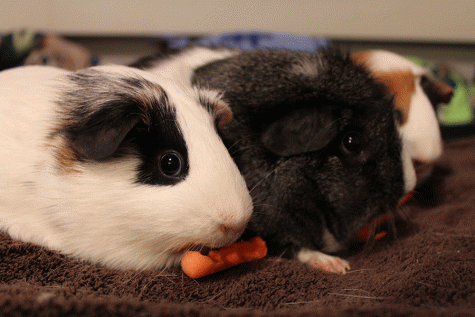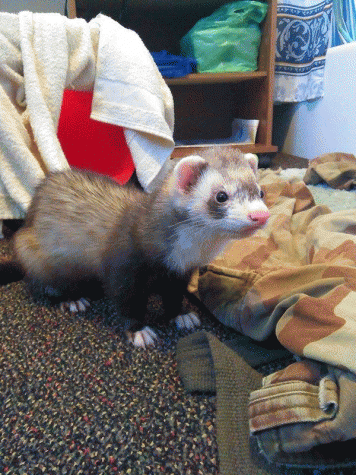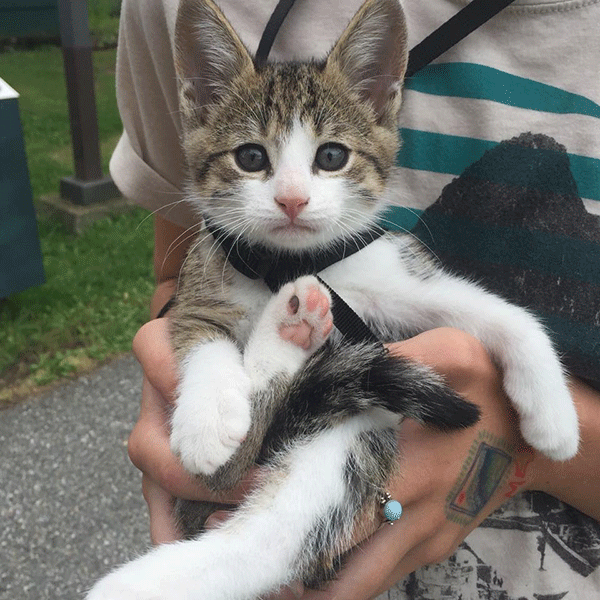Therapy Animals
The benefits of furry roommates
Resembling a scoop of vanilla ice cream drizzled with swirls of golden caramel, Cupcake makes soft chattering noises as she munches through a pile of mixed greens, acquired by her human from the dining hall via a to-go box.
Her mother, Jubilee, whose circle of black fur around her left eye gives the illusion that she is wearing a monocle, squeaks from their spacious enclosure. Oreo, who visually lives up to her name and who is the third member of the guinea pig trio that resides in Governor’s North on the campus of Johnson State College, chills out quietly in one of their little tree trunk shaped hideouts.
Faith Thibault (Cupcake, Jubilee and Oreo’s human) says that it only took a couple of weeks into the semester for the guinea pigs to recognize the sounds of the to-go box opening and become excited in anticipation of the delicious vegetables that await.
 Cat Hayes
Cat Hayes
Each morning, Thibault awakes to the sound of high-pitched squeaks and chitters from her furry roommates demanding breakfast. For Thibault and her guinea pigs, this is a mutually beneficial relationship.
“Knowing that something is there that depends on you for survival can just really help give you a sense of purpose,” said Thibault.
For many humans, life would not be the same without their animals by their side. And likewise, for many animals, life would not be the same without their humans by their side. For some students, leaving for college also means leaving behind their beloved animals at home. But at Johnson State College, some students can get permission to register their furry companions as therapy animals, granting them the privilege of having them live in their dorm rooms with them.
The benefits of therapy animals for students at JSC are numerous. Many students find that their therapy animals enable them to make more social connections with fellow students, provide them with companionship and comfort that aids in relieving anxiety and stress, and gives them incentive to get up in the morning because another life is depending on them.
“Taking care of someone else or something else makes me take better care of myself,” said Cat Hayes, who has a 3-month-old brown and grey kitten named Bramble.
“Bramble gets me up in the morning. By 7:30 he is requesting to be fed, which means stepping on my face,” said Hayes.
Hayes says Bramble loves cuddling and getting into mischief around her dorm room. When she is not taking him on a leashed walk around campus, Bramble loves visitors at their dorm room in Martinetti Hall.
“I think it’s important to have animals you can relate to and bond with,” said Corrina Skorker, who has two ferrets named Pepper and Oni.
Skorker adopted Pepper and Oni about 6 months ago after their two previous owners could no longer care for them properly, and she said that they are extremely mischievous creatures. She said that one time Oni stole a pair of her nail clippers and four of her skirts, and stashed them behind her bed. The nail clippers have yet to be found.
 Cat Hayes
Cat Hayes
While Pepper and Oni are able to visit Skorker intermittently at her dorm room on campus, she is still in the process of registering them as official therapy animals at JSC.
Skorker hopes that people are aware of the possibility of acquiring a therapy animal, but she also warns that it is a process.
To qualify for a therapy animal at JSC, a student must be diagnosed with a documented mental or physical disability and a licensed psychologist or therapist must verify that their patient has a disorder where a therapy pet would be necessary and beneficial.
The paperwork must then be brought to JSC Learning Specialist Rich Simmons.
Lastly, Assistant Director of Residential Life Jeffery Bickford is then responsible for finalizing the decision.
While this may be a long and arduous process for some, the consensus among animal owners is that the pros of having a therapy animal heavily outweigh the cons.
“I think they’re very good for motivation and maintaining happiness,” said Skorker. She emphasized that therapy pets are also a great way to make new social connections.
Skorker suggests having a pet day event on campus to bring more attention to therapy animals and their benefits. This would be an opportunity for both animals and humans to socialize and for other students to get a chance to experience some animal therapy.
“I think it would be a really nice experience for the community,” said Skorker.
Randa Morris, whose therapy animal is a black fancy rat named Jinxie, said that another benefit of having an animal is that you never have to worry about them judging you.
“Animals don’t judge you when you are having a bad mental health day and for many it’s really important to know that at least one living thing isn’t going to judge you for not being fully functioning one day,” said Morris.
For many college students, something as simple yet profoundly important as this can help them through their semester day by day.
“Besides, they can keep secrets,” said Thibault of her guinea pigs. “Because they don’t squeal, they squeak.”



